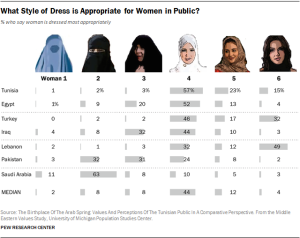January 17-2014

The University of Michigan’s Institute for Social Research recently polled men and women in seven Middle Eastern countries—not including Iran—asking them what they thought was the most appropriate head wear for women.
Those polled were showed pictures of six choices ranging from the full-cover burqa to bare hair.
Combining the results from all seven counties, the overwhelming preference was for the modern tight headscarf, often called al-amira, that was rarely seen in the Middle East until recently and is the almost uniform choice of young Muslim women in Turkey and North America who choose to be covered.
There was almost no support for either extreme—the burqa or the uncovered head.
The seven countries in which the poll taken were Pakistan, Saudi Arabia, Turkey, Iraq, Lebanon, Egypt and Tunisia.
There were differences among the countries, however. The niqab, in which only the eyes are visible, was the overwhelming first choice among Saudis and the narrow first choice among Pakistanis, while not topping 10 percent anywhere else.
An uncovered head was the first choice in tiny Lebanon and second place in Turkey.
The Iranian-style chador drew substantial support in some countries, coming in second in Pakistan, Iraq and Egypt, but couldn’t reach 10 percent anywhere else.
But perhaps the most interesting response came when people were asked if they thought women should have the right to dress as they wished. The least support for that idea came from Egyptians, where women have the right to decide what they wear. But very high support for that proposition came in ultra-conservative Saudi Arabia, where women have no such right.
Here is the proportion in each country that supported a woman’s right to dress as she chooses:
Tunisia 56%
Turkey 52%
Lebanon 49%
S.Arabia 47%
Iraq 27%
Pakistan 22%
Egypt 14%
On other questions:
• The respondents overwhelmingly disapproved of polygamy. The lowest rate of disapproval was in Saudi Arabia where a slight majority of 51 percent disapproved.
• Overwhelming majorities believe that a wife “must always obey her husband.” The largest bloc of disagreement with that proposition was in Lebanon where 38 percent said no. But a mere 5 percent of Egyptians disagreed.
• Support for women to have access to university education was overwhelming in most countries—but not in Pakistan and Saudi Arabia.
• Majorities in all seven countries said they believe that “men should have more right to a job than women.”
The poll results were not reported by gender, unfortunately. Nor were they reported by faith, though the results may have been skewed in Lebanon where one-fourth are Christian.
